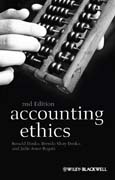
This new edition of Accounting Ethics has been comprehensively updated to deal with the significant changes within the accounting profession since 2002; the authors systematically explore the new range of ethical issues that have arisen as a result of recent developments, including the financial crisis of 2008. Highlights the debates over the use of fair-value accounting and principles-versus rules-based standards Offers a comprehensive overview of ethics in accounting, as well as an examination of and recommendations for solving the current crisis in this field Investigates the nature and purpose of accounting Uses concrete examples and case studies, including current situations Examines the ethical responsibilities of individual accountants as well as accounting firms INDICE: Acknowledgments. Preface. Introduction. 1 The Nature of Accountingand the Chief Ethical Difficulty: True Disclosure. I The Nature of Accounting. II Ethics of Disclosure. III The Financial Statement. IV Roles an Accountantcan Fulfill. V Development of Explicit Accounting Standards and Regulations. VI The SarbanesOxley Act (SOX). VII Recent Scandals that Provoked More Regulation. VIII Conclusions. 2 Ethical Behavior in Accounting: What Is Ethics?. I What Is Ethics?. II Ethics: The Intellectual Enterprise. III Actions. IV Social Practices, Institutions, and Systems. V Why Study Ethics?. VI Being Ethical: How to Determine What to Do. VII Questions to Ask to Justify An Action: The Basis of Ethical Theory. VIII Using the Reasons. IX Ethical Dilemmas. X Some Classic Moral Dilemmas. 3 Ethical Behavior in Accounting: Ethical Theory. I Egoism. II Utilitarianism. III Kant and Deontology. IV Deontological Ethics. V The First Formula of the Categorical Imperative. VI The Second Formula of the Categorical Imperative. VII Virtue Ethics. 4 Accounting as a Profession: Characteristics of a Profession. 5 Accounting Codes of Conduct. I AICPA Professional Code of Conduct. II Code Principles. III Criticisms of the Code of Conduct. 6 TheRules of the Code of Conduct. I Section 100 Independence, Integrity, and Objectivity. II Section 200 General Standards Accounting Principles. III Section 300 Responsibilities to Clients. IV Section 400 Responsibilities to Colleagues.V Section 500 Other Responsibilities and Practices. 7 The Auditing Function. I The Ethics of Public Accounting. II Trust. III The Auditors Responsibility to the Public. IV The Auditors Basic Responsibilities. V Independence. VI Independence Risk. VII Professional Skepticism. VIII Reasonable Assurance. 8 The Ethics of Managerial Accounting. I Reasons Used to Justify Unethical Behaviors. II Blowing the Whistle. 9 The Ethics of Tax Accounting. 10 Ethics Applied to the Accounting Firm. I Accounting as a Business. II The Social Responsibility of Business. III Good Ethics is Good Business. IV Ethical Responsibilities of Accounting Firms. V The Accounting Profession in Crisis. Afterword: Current Debates on Accounting Issues. I Fair Value and Principles vs. Rules. II Fair Value Accounting. III Arguments For and Against the Fair Value Approach. IV Summary. V Principles vs. Rules. VI Introduction. VII Isnt GAAP Already Principles Based?. VIII An Example: The Continental Vending Case. IX Recent Developments of Present Fairly. X A Better Question. XI Argument for a Rules Based Approach.XII What Would a Principles Based Approach Look Like? The True and Fair Override. XIII Argument for a Principles Based Approach. XIV Conclusion. Appendix A: Summary of SarbanesOxley Act of 2002. Appendix B: The IMA Code of Conduct for Management Accountants. Index.
- ISBN: 978-1-4051-9613-0
- Editorial: Wiley-Blackwell
- Encuadernacion: Rústica
- Páginas: 256
- Fecha Publicación: 25/03/2011
- Nº Volúmenes: 1
- Idioma: Inglés
